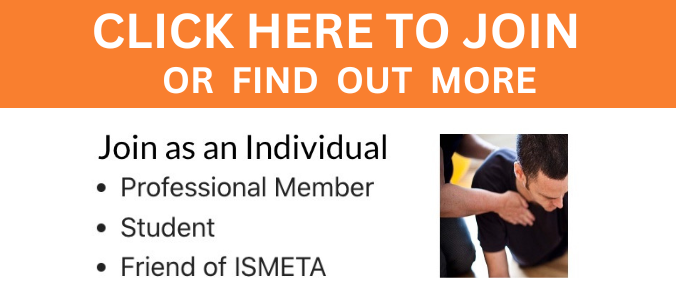A FREE INTRODUCTORY SESSION
Pain Science for Somatic Practitioners
Tim Cacciatore Ph.D., MSTAT
Mari Hodges MScMed (Pain Management), TPS, M.AmSAT, M. AAPTA
November 2, From 12:00 - 1:00 pm ET
Find your local time here.
Register Below to Access the Free Introduction Video
ISMETA MEMBERS $ FREE
NON MEMBERS $ FREE
Join us for a free introduction to Pain Science for Somatic Practitioners. The full class series is an experiential, eight-module course.
The world has an increasing population in pain, and pain is the most common reason that people seek out complementary therapies. Often these can be helpful. But there are many unanswered questions: What causes chronic pain anyway? What are the common misconceptions about pain? How does chronic pain change the nervous system? How do somatic therapies help? Are there ways in which work can be improved to benefit clients? What should we say to clients and doctors about pain? When should we refer out, and to whom?
Most somatic approaches involve no modern training about pain, but we think it can be invaluable. In the past few decades the science of pain has become far more relevant for somatic practitioners. Understanding the advances in pain science can help to develop optimal strategies for working with the unique challenges of a person with persistent pain.
In the full webinar we approach modern pain science in a way that is accessible for somatic practitioners. It is taught by two Alexander Technique teacher-scientists who have a lived experience of chronic pain. We’ll delve into the biological, psychological and social factors that contribute to pain in a systematic way that looks at the whole picture. We’ll focus discussions on how somatic practices relate to a modern understanding of pain science as well as pain management and recovery. We will look at the success of emerging interventions for pain and highlight the unique contributions that somatic practices bring.
Each week we will cover one or two modules. Participants will work through course content before the week’s live session. This entails participant’s watching approximately 1 hour of pre-recorded video lecture, writing a short essay to bridge their practice and experience to the course content and answering a multiple-choice quiz to reinforce important concepts. There is also optional reading for those who want to go deeper on particular topics.
Learning goals for the full course - Participants will:
- Recognize the multidimensional and multifactorial nature of pain experience
- Understand the pain system, including the protective nature of pain and how it can become maladaptive
-
Think critically about and articulate how somatic practices may influence pain
Live participation is encouraged. However, if you are unable to attend on that date, the recording will be available as long as you register in advance.
The full course will run for 8 Thursdays:
- January 16, 23, 30, February 6, 13, 20, 27, March 6, 2025 from 12:00 - 1:30 pm ET
- Please find your local time for this event HERE.

Tim Cacciatore
Ph.D., MSTAT
Tim Cacciatore, Ph.D., MSTAT is an expert in the neuroscience of postural tone and its relationship with movement coordination. He was motivated to study postural control because of the lack of plausible scientific explanations for how the Alexander Technique affected posture and helped his own back pain. His research has aimed to use somatic methods as a tool to reveal properties of the motor system. He has published numerous peer-reviewed articles with recognised figures in motor control such as Drs. Victor Gurfinkel, Fay Horak, and Brian Day at institutions that have included University College London, Oregon Health Sciences University, and the University of California, San Diego.
Dr. Cacciatore later trained as an Alexander Technique teacher with Shoshana Kaminitz in London. He has extensive experience with other somatic disciplines, such as Craniosacral Therapy, Cranial Osteopathy, Acupuncture, and Tui Na. His two decades of research and numerous peer-reviewed publications about postural tone, movement and the Alexander Technique make him a leading expert on the science of somatic practices. He currently collaborates with Dr. Rajal Cohen at the University of Idaho, Moscow.

Mari Hodges
MScMed (Pain Management), TPS, M.AmSAT, M. AAPTA
Mari Hodges, MScMed (Pain Management), TPS, M.AmSAT, M. AAPTA, is an Alexander Technique teacher, pain coach, and pain educator. She completed her Alexander Technique training at the Escuela de Técnica Alexander Buenos Aires in 2014. She holds a BA in sociology from UCLA, a Therapeutic Pain Specialist certificate from Purdue University, and a Master of Science in Medicine in Pain Management from the University of Sydney. She is also certified as an Art of Running instructor. In her free time you can find Mari reading up on pain science, dancing, cross-country skiing and playing the violin. Mari goes back and forth between Montana, USA, and Argentina. For more information on Mari visit www.DiscoverEase.how.



